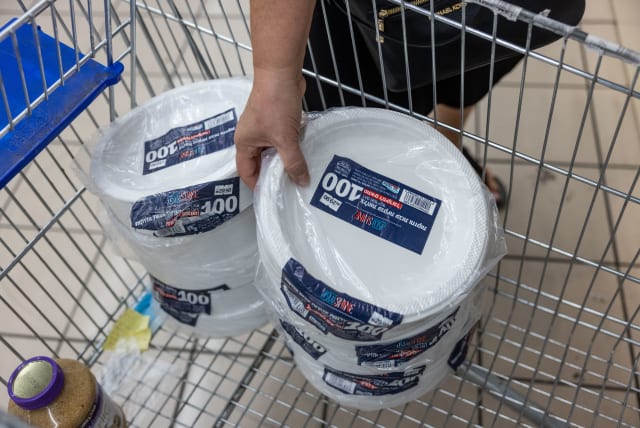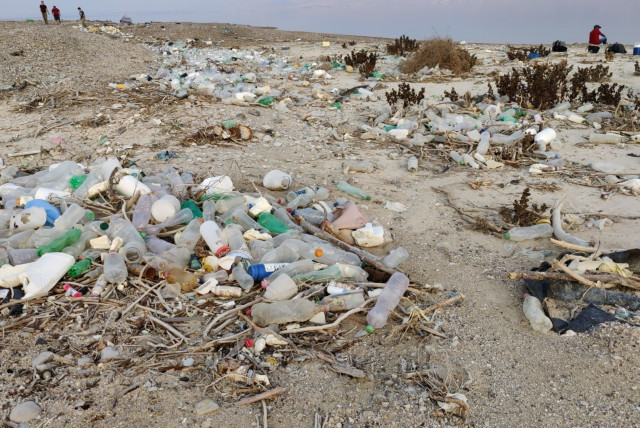How can Israel go plastics-free? - opinion

Since plastics were invented in the 1950s, we have discovered that they are not good for the environment, our ecosystem, or our health, yet the world seems addicted to using them.
The Passover holiday – a time of marked increase in the use of single-use plastics – is over.
According to Plastic Oceans International, every year the world produces roughly 400 million tons of plastics, half of which is for single use, and only 9% is recycled. The rest spends hundreds of years clogging landfills or ending up in the oceans. Microplastics have been discovered in the stomachs of fish, and studies show that people consume around a spoonful of plastics every week. Plastics have even been found in mothers’ breast milk.
As if this weren’t enough, most plastic is made using fossil fuels, which creates billions of greenhouse gas emissions. Since plastics were invented in the 1950s, we have discovered that they are not good for the environment, our ecosystem, or our health, yet the world seems addicted to using them.
So, going forward, how can we avoid using plastics?
The obvious answer is to opt for reusables – reusable plates, cutlery and especially shopping bags. Every year, approximately 500 billion plastic bags are used across the globe. That’s over one million plastic bags used every single minute, and each plastic bag has an average function of only 15 minutes. It’s not always easy to remember to take reusable bags to the shops, and we’re all going to slip up at times, but even reducing our use of plastic bags can have a positive impact on our immediate environment.
However, with packaging accounting for over 40% of plastic use, there appears to be only so much that individuals can do. That’s why Israel’s start-up sector is looking at the entire lifespan of plastics – from sourcing, manufacture, use, processing and waste – working to find solutions and helping to create a more circular economy.
A recent event called Disrupting the Future of Plastics highlighted some potential innovations (see www.futureofplastics.org for more information). Arc Impact brought together key stakeholders, including start-up and company founders, international and local investors, industry representatives, plastic manufacturers, academics, nonprofits, government entities and experts, to accelerate the development of “Plastech.” Out of dozens of applicants to the competition, five start-ups were ultimately short-listed to participate in a Shark Tank-style event.
The shortlist
Plastic Back uses a low temperature process to convert unrecyclable plastic waste back to its original form, breaking it down into oils, waxes and other valuable chemicals. The company then supplies these to the petrochemical industry, which uses them to create new products, reducing landfilling and the use of new petroleum for plastics. The technology helps waste handlers and waste manufacturers to treat waste on-site, avoid removal and treatment costs, and even create profit from plastic waste.
Enzymit is working on novel enzymes that will be able to break down polyethylene and polypropylene, which are currently considered nonbiodegradable plastics. The company says it is building a platform using complex computational design and deep learning algorithms. The goal is to manufacture plastics containing the new enzymes, which will break down under certain conditions, and they plan to do this at a fraction of the cost and time of alternative approaches.
Balena has created BioCir™, its proprietary, fully compostable and biodegradable thermoplastic material. The company says that this is the first durable, flexible and comfortable alternative to plastics in the fashion industry. In the summer of 2022, Balena launched and sold out its first shoes, the BioCir™ Slides. This is the first fashion product to be made entirely of the BioCir material, which is also vegan and “cruelty free.” Once customers feel they have come to the end of their Slides, the company says it will take them back and ensure the full decomposition and biodegradation of the material.
Triple W says it produces high-value biomaterials and bioplastics out of food waste. It does this through a unique process that the company has developed as part of implementing a circular economy model. The innovative lactic acid production process helps to keep food waste out of landfills, produces bio-based materials, and cuts carbon emissions at the same time.
While bioplastics are often considered more expensive than traditional fossil-based plastics, the company aims to change that. It says its process can be implemented anywhere in the world where food waste is discarded (i.e., everywhere). It envisions using its process to create thousands of products that are widely used, from T-shirts, car parts and toy blocks to yogurt cups and tea and chips bags. The difference, they say, is that these products will be made to last and to be reused, converting trash into treasure.
The winner
The company that came out on top of the “Shark Tank” event was Biotic Circular Technologies. Biotic envisions a world where plastics aren’t a concern and there is no need to recycle them. It has developed a fully bio-based, fully biodegradable plastic alternative that it says can replace fossil-based plastics, with at least a 50% reduction in costs. Its alternative is made from organic materials, such as seaweed and algae, using a secret recipe.
CEO and co-founder of Biotic Circular Technologies, Adi Goldman, explains: “We aim to provide fully biological, biodegradable drop-in alternatives to fossil-based plastics and plan to offer a variety of commodities across the globe to fulfill global plastic demands, ensuring an agnostic and seamless transition, for both consumers and producers, to environmentally friendly alternatives. We are in the final stages of moving into our pilot facility, which will allow us to scale production volumes and progress with our corporate pilot collaborations. We believe in localization and are conducting discussions to explore laying the groundwork for additional facilities and partnerships around the globe.”
The winner will receive funding, and all companies benefited from speed-dating investor sessions and the opportunity to match companies to mentors.
As Nicky Newfield, managing partner at Arc Impact Fund, said: “We are urgently fighting against time to keep our planet from warming above 1.5 degrees. Greenhouse gas emissions increase the planet’s heat. Almost all plastics are manufactured using fossil fuel that emits CO2 to manufacture, accounting for 3.5% of global gas emissions.
“In our call-out, we found that Israel’s innovation ecosystem has over 58 companies that are bringing alternative materials to use to make plastics that don’t emit gases, and innovative ways to deal with the end of life of plastics. We believe Israel has a huge part to play in the cleaner future of plastics.”
Curbing our addiction to plastics isn’t easy. I get it – I really do. Passover and entertaining in general require lots of planning and a huge amount of energy. The last thing we want to do is wash up at the end of a Seder of 20 plus people. But we’ve got one year to plan our alternatives. As well as “Next year in Jerusalem,” let’s also aim for next year to be plastics-free.
The writer is Middle East correspondent for India’s WION (World Is One) TV news channel. The author of Tikkun Olam: Israel vs COVID-19, she has helped numerous multinationals report on their contributions to tackling the UN’s Sustainable Development Goals. On Twitter: @JodieCohen613.
Jerusalem Post Store
`; document.getElementById("linkPremium").innerHTML = cont; var divWithLink = document.getElementById("premium-link"); if (divWithLink !== null && divWithLink !== 'undefined') { divWithLink.style.border = "solid 1px #cb0f3e"; divWithLink.style.textAlign = "center"; divWithLink.style.marginBottom = "15px"; divWithLink.style.marginTop = "15px"; divWithLink.style.width = "100%"; divWithLink.style.backgroundColor = "#122952"; divWithLink.style.color = "#ffffff"; divWithLink.style.lineHeight = "1.5"; } } (function (v, i) { });

